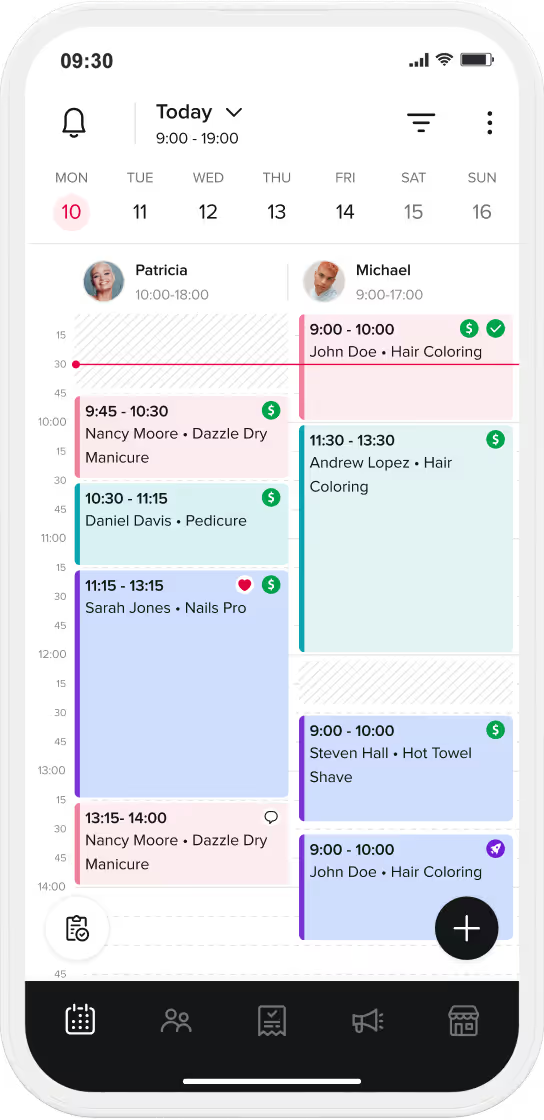

Feeling demotivated, exhausted, and unsatisfied with your job? Burnout is a reality in the beauty industry, thanks to the long working hours, the non-stop socializing, and the high-stress environment. It often goes unrecognized and can lead to anxiety and depression, so it’s not to be taken lightly.
To avoid burnout, it’s important to identify the signs of it, and then aim to prevent it by using a selection of tips and tricks from qualified psychologists.
We want our service providers to be happy and healthy, giving only their best to their loyal customers. To achieve this, we’ve put together 5 of the most important ways to identify and prevent burnout while working in the beauty industry.
Recognizing signs of burnout is the most important step in this process. Ask yourself the following questions:
If you’re answering yes to any of these questions, or you feel like you’re heading this way, you’re probably experiencing burnout. It’s time to get help from a psychologist, take a much-needed vacation, or open up to a close friend or colleague about your situation. There is no shame in feeling the way you do.

Once you’ve recognized your symptoms, and you’ve accepted that you’re battling with burnout, it’s time to understand what you’re going through. Psychologists talk about the 5 stages of burnout, which is an easy tool to use to analyze your situation.
Stage 1: The honeymoon stage.
You’ve just started a new job. Feeling energized? Motivated? Mind racing with ideas? This is the first stage of burnout - often employees or new business owners go in with all they’ve got, and it can be a lot for your body and mind to handle. When starting something new, like running (or a job), try your best to pace yourself and keep it cool.
Stage 2: Onset of stress.
As you move out of the honeymoon stage, you start to experience stress more frequently. You might become less productive, get fatigued more easily, or struggle to enjoy activities outside of work. It’s really important that you reflect on this and understand that you might be heading towards burnout.
Stage 3: Chronic stress.
This stage is really hard on your mental and physical health. You’ll start to feel more stressed than not, and feelings of apathy and wanting to withdraw socially will sneak up on you. Relationships can often take strain, too.
Stage 4: Burnout.
By the time you’ve reached the burnout stage, you won’t be able to function normally anymore. You become consumed by work problems, feelings of numbness may occur, and self-doubt takes over. Physically, you might start experiencing headaches and gastrointestinal issues.
Stage 5: Chronic burnout.
If left untreated, burnout can become a part of your daily life - leading you to believe that you’re not good enough, your work and life aren’t important enough, and you can end up in a state of anxiety and depression. Your job, relationships, and life can be in serious jeopardy at this point.
If you’ve noticed symptoms of burnout, or you’ve recognized which burnout stage you’re struggling with, you can learn to effectively manage your stress and avoid going further down this path. We recommend the following:
If you’re feeling a little stressed behind the chair, or you’re getting extra irritable with your clients, take it as a sign that you maybe need a break. Before reaching breaking point, set aside a day or two to rest and recover. Drink plenty of water, eat wholesome, hearty meals, and try meditating or walking. Practice self-care regularly. It’s really important that your mental health comes before your job - keep reminding yourself of this.

With a healthy diet, plenty of rest, some exercise, and a strong support system, you can fully recover from burnout and bounce back better than ever before. Unfortunately, it’s not a walk in the park, and it might take some hard conversations with your boss, colleagues, friends, and family. You might need to set some firm boundaries - especially if you have clients that have been breaking boundaries with you for years.
The best way to ensure you never go down the burnout path is to ensure a strict work/play schedule.
Mental health issues are a reality, and making sure that you’re okay is the most important thing you can do. If you or a loved one is experiencing symptoms of anxiety or depression, tap into these resources:
When you’re feeling stuck, just remember that burnout can (and should) be temporary, and you’re not alone.

